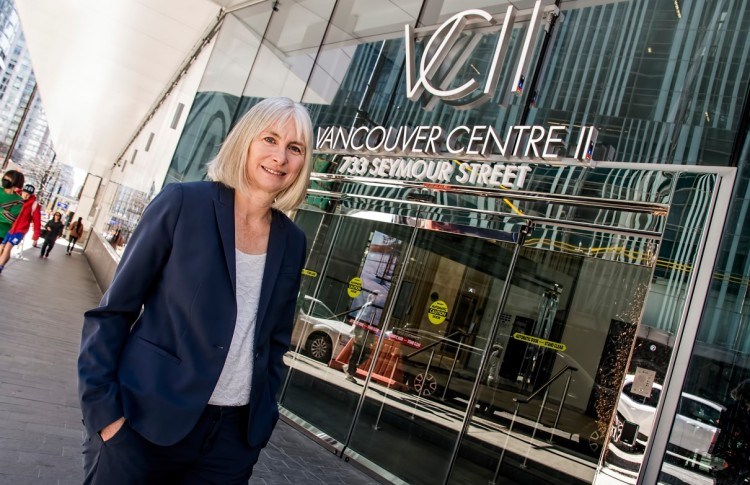Financial pressure points in the global banking system threaten to torment Vancouver’s commercial real estate market, which has recently managed to weather market shocks.
“It’s like the classic duck on the water right now,” Colliers International associate director of research, Susan Thompson, told BIV.
“It’s floating there, looking kind of calm, but there’s a lot going on underneath the surface.”
Leasing agents told BIV that before the COVID-19 pandemic slammed the brakes on transactions.
Since then, the economy has faced supply-chain backlogs, labour shortages, fallout from the war in Ukraine, soaring inflation and eight straight Bank of Canada interest-rate hikes.
Each of those challenges caused some to speculate that a recession was lurking.
Cracks in the global financial system is the latest hobgoblin to make market watchers’ spines tingle.
Bank runs, liquidity concerns and liabilities exceeding assets contributing to the closure of several U.S. banks earlier this month – Silvergate Capital, Silicon Valley Bank and Signature Bank.
Global jitters then surrounded Switzerland’s second-largest bank, Credit Suisse, which the country’s central bank bailed out with a US$54 million loan. Switzerland’s largest bank, UBS, then spent US$3.2 billion to buy Credit Suisse.
A different kind of bailout was simultaneously taking place in the U.S., where a consortium of commercial banks teamed up to provide a US$30 billion deposit lifeline to struggling First Republic Bank (NYSE:FRC), but that move failed to placate nervous investors, who pushed that bank’s stock price down by about one-third the next day. The following trading session saw First Republic’s shares dive another 47 per cent, as depositors lined up to withdraw funds. The stock has remained volatile.
An old adage goes that when the U.S. sneezes, Canada catches a cold. So, it is an open question whether the current banking jitters south of the border could infect Canada’s banking system.
Bank of Canada deputy governor Toni Gravelle said in a speech yesterday that the central bank was "ready to act in the event of severe market-wide stress and provide liquidity support to the financial system."
University of British Columbia Sauder School of Business banking professor Rajesh Vijayaraghavan told BIV that the Canadian banking system is more stable than the one in the U.S., partly because Canada’s banks are more consolidated.
Risks for the larger Canadian economy and its commercial real estate sector, however, still exist.
“When a banking crisis grows, it could lead to a credit crunch, where banks cut their lending, or tighten lending standards,” he said.
“Usually, it could happen across loan portfolios, including commercial real estate. This phenomenon has been seen in prior financial crises.”
Even if the spectre of a banking-system collapse fades, commercial real estate developers and tenants will face tighter financial conditions.
The Bank of Canada has raised its policy interest rate to 4.5 per cent, from 0.25 per cent last March, with commercial banks’ lending rates usually about two points above the policy rate.
This escalates the cost of building and buying commercial real estate because developers and landlords have higher financing costs.
“We’re seeing the number of sales is definitely down,” said Thompson, referring to office buildings and individual strata-office units.
“There are a lot of companies that have maybe put their pen down – while prices are moving, and interest rates have gone up – until they can start to make sense of the financial equations again. We’re also seeing it on the leasing side.”
Many office tenants are still trying to determine how much office space they need, given that many, if not most, employees work at home at least some of the time, she said.
One trend has been a surge in office sublease space available downtown, which has pushed up the city’s vacancy rate to its highest level since 2017.
CBRE researchers calculated downtown Vancouver’s vacancy rate at 9.8 per cent in the fourth quarter of last year – slightly below the 2017 vacancy-rate peak of about 10 per cent, which at the time was a 12-year high.
“Total vacant sublease space downtown reached 722,000 square feet, the highest number recorded in 30 years due to an uptick in large and full-floor spaces given back by major tenants downtown,” CBRE said in its most recent office real estate report.
CBRE research analyst Aaron Bowbyes told BIV that some firms putting large blocks of space on the market include SAP at 910 Mainland Street, Kabam at Â鶹´«Ã½Ó³»Centre II, and Microsoft Corp. (Nasdaq:MSFT) at 725 Granville Street.
Vancouver’s office-vacancy rate is low compared to other North American downtown cores
Despite an office vacancy rate that is nearing an 18-year high, downtown Â鶹´«Ã½Ó³»has done better than peers in having tenants fill space.
“For big cities, Vancouver’s office-vacancy rate is among the lowest in North America,” said GWL Realty Advisors’ vice-president of research and strategy, Wendy Waters.
She pointed to CBRE data that calculated Calgary’s downtown office-vacancy rate at 32.6 per cent – marginally higher than the 32-per-cent vacancy rate in the downtown Dallas-Fort Worth area.

Other cities with downtown vacancy rates substantially higher than Â鶹´«Ã½Ó³»include:
•San Francisco, at 27.6 per cent;
•Denver, at 27.2 per cent;
•Houston, at 26.7 per cent; and
•Atlanta, at 25.6 per cent, according to CBRE data.
Larger Canadian cities also have higher downtown office vacancy rates than Vancouver, given Montreal’s 16-per-cent rate, and Toronto’s 13.2-per-cent rate, Waters said.
One reason for this could be that Â鶹´«Ã½Ó³»has long had fewer square feet of office real estate per capita, compared with other cities, said Thompson. The result is that when real estate pullbacks happen, they are not as severe.
“Vacancy rates have gone up in Vancouver, but so has the total amount of occupied space,” Waters added.
She noted big new developments coming online in downtown Â鶹´«Ã½Ó³»in the fourth quarter of 2022, with the Stack building at 1133 Melville Street, and the Â鶹´«Ã½Ó³»Centre II building at 733 Seymour Street combining to add 914,000 square feet to the market.
Bosa Development’s 355,000 sq.-ft. building at 320 Granville Street is set to complete in the coming weeks. One of its distinctive features is that it has more than 150,000 square feet of strata-office space, with the rest being leasable space.
Quadreal Property Group’s Post development in the former main post office site, in the block bounded by West Georgia, Hamilton, Dunsmuir and Homer streets, is set to add about 1,050,000 square feet of office space fully leased by Amazon.com Inc. (Nasdaq:AMZN) by mid-2023.
With Amazon’s CEO Andy Jassy last week announcing plans to become more efficient by shedding staff, it .
Amazon plans , and the company has not said if any of its 10,500 workers in B.C. will get pink slips.
Jassy also last month laid out plans to require more Amazon office workers go back to workplaces more often starting May 1 – something that could increase Amazon’s demand for office space and lower the chance of it subleasing space at The Post.
“We should go back to being in the office together the majority of the time (at least three days per week,)” Jassy wrote in a February note to employees.
Amazon now leases downtown Â鶹´«Ã½Ó³»space at: Telus Garden, (510 West Georgia Street); the Exchange, (475 Howe Street); 745 Thurlow Street; and an Oxford Properties building at 402 Dunsmuir Street.
It is likely that Amazon will vacate some of that space as it moves workers to The Post, likely in phases.
Microsoft is another technology giant readying for a major move in downtown Vancouver.
It has leased 405,000 square feet at the 32-storey, 534,000-sq.-ft Bentall Six development at 1090 West Pender Street, which is expected to be complete later this year.
Microsoft leases space at four other downtown Â鶹´«Ã½Ó³»locations, and its plan is to consolidate its workforce, Thompson said.
That in turn would lead to more sublease space on the market than what Microsoft is already offering.
“All of those [other Microsoft offices in downtown Vancouver] are slowly going to be – if they’re not already being marketed – coming to market,” she predicted. •
​



